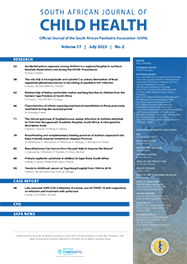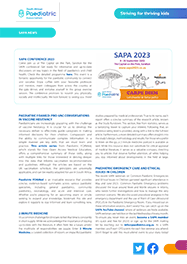Research

The effects of a home exercise programme on the exercise endurance of children infected with HIV
Abstract
Background. Human immunodeficiency virus (HIV) infection can negatively affect the exercise endurance of children. There is a lack of studies investigating the effects that home exercise programmes (HEPs) have on the exercise endurance of children in South Africa who are HIV infected.
Objective. To investigate the effects of a HEP on the exercise endurance of children infected with HIV.
Methods. The study was conducted at a paediatric HIV treatment clinic in Johannesburg. Sample size calculations were done using the Excel sample size calculator for continuous variables. Participants were randomised into two groups using a random number table. One group underwent a 12-week HEP while the control group continued with standard care. Exercise endurance was assessed using the sixminute walk test (6MWT) at baseline and after 12 weeks. The total distance walked was compared between groups.
Results. Sixty-two children infected with HIV between the ages of seven and nine years were enrolled. After 12 weeks, the distance walked by children who had done the HEP increased, but no significant differences were found between and within the groups’ six-minute walk distance (6MWD) at baseline or at 12 weeks’ follow-up. Boys walked significantly further than girls (boys: 449.15 m; girls: 412.46 m, p=0.04) at baseline, regardless of the group.
Conclusion. There was no significant difference in walking distance between the two groups. A HEP with different components and of longer duration may yield better results. Further research is needed on the impact that a HEP could have on the exercise endurance of South African children infected with HIV
Authors' affiliations
C N Naidoo, Department of Physiotherapy, Faculty of Health Sciences, University of the Witwatersrand, Johannesburg, South Africa
N Benjamin-Damons, Department of Physiotherapy, Faculty of Health Sciences, University of the Witwatersrand, Johannesburg, South Africa
R Strehlau, Department of Physiotherapy, Faculty of Health Sciences, University of the Witwatersrand, Johannesburg, South Africa
J Potterton, Department of Physiotherapy, Faculty of Health Sciences, University of the Witwatersrand, Johannesburg, South Africa
Full Text
Cite this article
Article History
Date published: 2020-12-14
Article Views
Full text views: 828

.jpg)



Comments on this article
*Read our policy for posting comments here